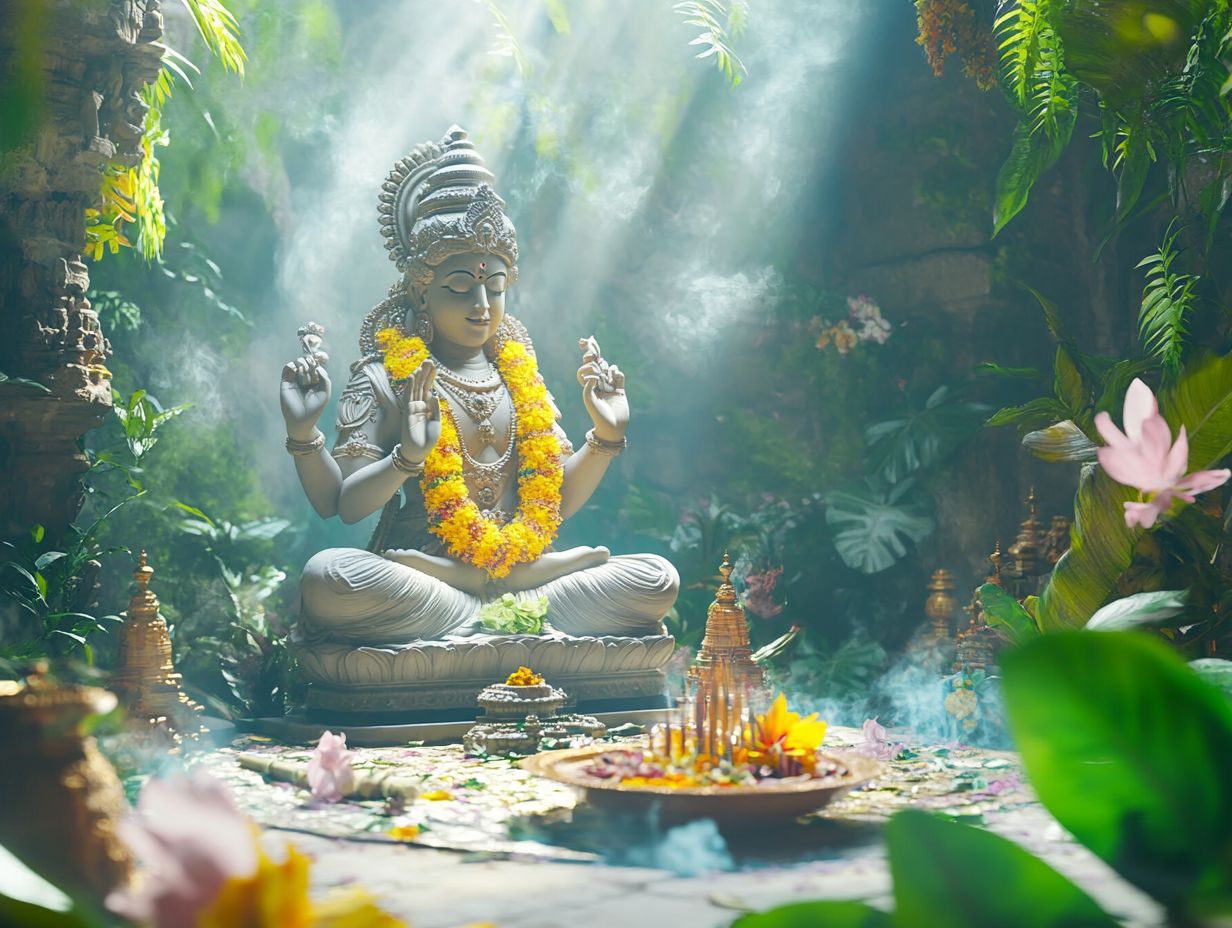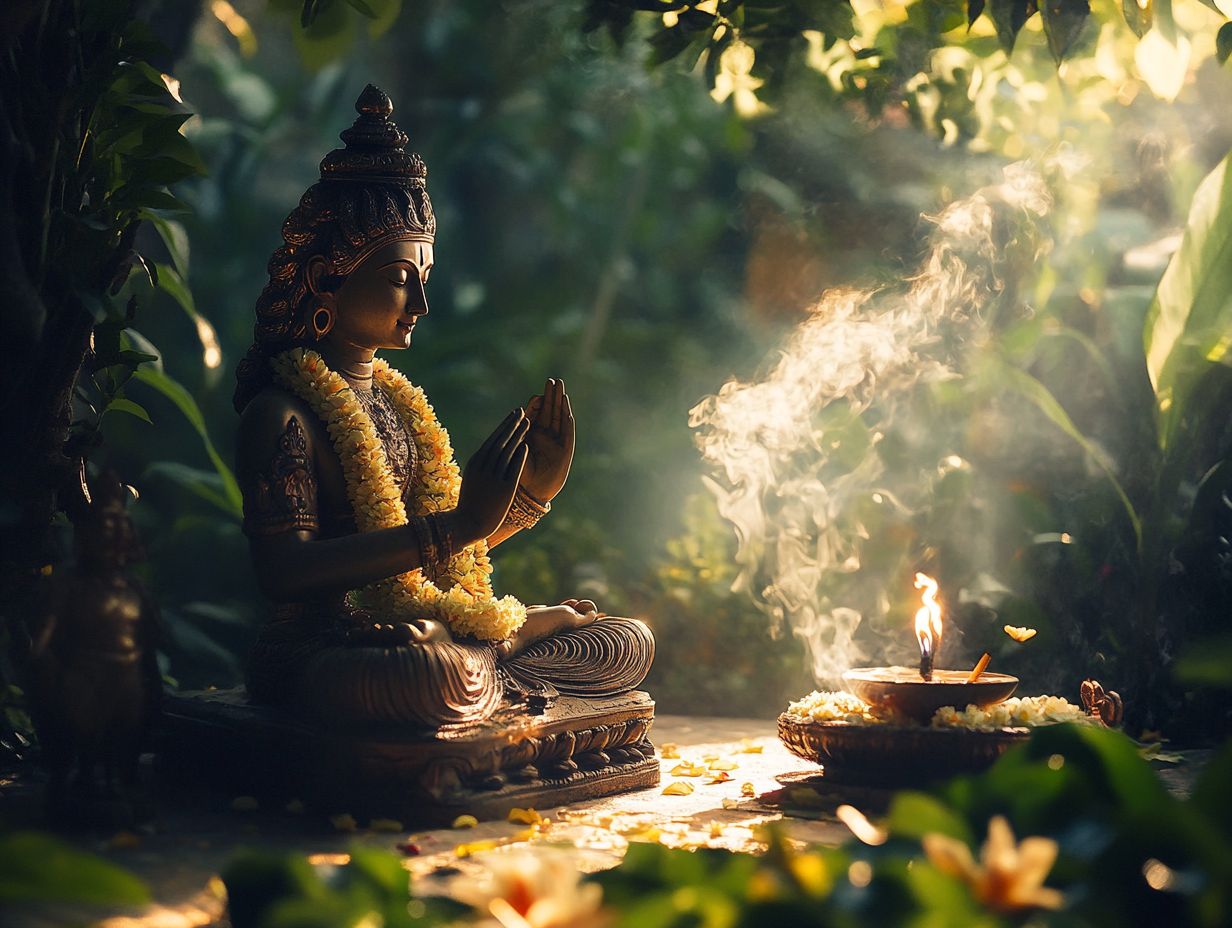How Do Curses Work in Hinduism?
Curses occupy a prominent position within Hindu belief systems, intricately woven into the concepts of karma, intention, and the spiritual realm, encompassing the astral plane and divine forces. This exploration delves into the diverse categories of curses, ranging from personal afflictions to generational burdens, as well as those purportedly originating from deities, or ancestral influences.
Examining the mechanisms by which these curses operate within Hinduism unveils the complex interplay between intention, fate, dharma, and divine intervention. The discussion also highlights various signs that may suggest the presence of a curse, such as hexes and spells, thereby presenting a captivating subject for those intrigued by this profound element of Hindu spirituality.
What Are Curses in Hinduism?

Curses in Hinduism embody a profound intersection of spirituality, karma, and belief, often viewed as supernatural forces capable of influencing an individual’s fate and well-being. These curses arise from the actions of individuals and their interactions with deities and elemental forces, reflecting the intricate relationship between dharma and karma.
Negative energy may manifest due to improper rituals or the invocation of mantras devoid of intention. To explore curses is to delve into the rituals that surround them, the powerful energy they invoke, and the cultural implications they hold within the broader context of Hindu philosophy and practices.
What Are the Types of Curses?
Curses within Hinduism can be categorized into distinct types, each embodying unique origins and consequences for those who encounter them.
Personal curses frequently emerge from individual actions or intentions, signifying the personal accountability of the individual. In contrast, generational curses may endure through family lineage, underscoring the profound impact of ancestry on one’s destiny.
Additionally, curses inflicted by deities or demons often stem from transgressions against divine beings, while ancestral curses serve as a poignant reminder of the necessity to honor one’s heritage and familial connections.
The ramifications of such curses can lead to negative karma, influencing both present circumstances and future generations.
1. Personal Curses
Personal curses in Hinduism arise from an individual’s actions, intentions, or relationships, often manifesting as negative energy that can significantly impact one’s life and karma. Such curses may originate from thoughts, words, or deeds directed toward others, highlighting the intricate duality of existence where personal actions yield far-reaching consequences.
A comprehensive understanding of these curses necessitates a profound examination of the beliefs and emotions that underlie their existence. Frequently, the energy associated with such curses is not solely born from malice; it may also stem from unresolved grievances or deep-seated fears.
Consequently, the journey to overcoming these personal curses is vital for spiritual progression. Individuals may engage in specific rituals, such as reciting targeted mantras designed to dispel negative energy, thereby reclaiming their inherent power.
Spiritual cleansing practices assume a crucial role in transforming this energy, facilitating personal growth and self-realization. By purifying the mind and spirit, one not only alleviates the effects of these curses but also nurtures a more harmonious relationship with both their inner self and the surrounding universe.
2. Generational Curses
Generational curses, often referred to as ancestral curses, are perceived as inherited karma that influences multiple generations, establishing a persistent cycle of negative energy that can be notably challenging to break. These curses frequently arise from unresolved issues, transgressions, or detrimental actions committed by ancestors, which can manifest in descendants through various challenges, including emotional turmoil or financial hardships.
Recognizing these generational patterns is vital, as it enables individuals to pinpoint and confront the issues that have long afflicted their family dynamics. By understanding the origins of these curses, one can initiate a healing journey through focused spiritual cleansing practices and rituals. Techniques such as meditation, shadow work, and family constellation therapy can effectively dismantle the negative imprints imposed by the past.
Moreover, the incorporation of affirmations and visualization serves to enable individuals, allowing them to reclaim their identities, shatter these insidious cycles, and attain a profound sense of liberation. This healing process transcends the individual, fostering healthier relationships and nurturing resilience within future generations.
3. Curses from Deities or Demons
Curses from deities or demons in Hinduism embody the intricate balance of divine order and justice, often acting as forms of divine retribution for actions that transgress spiritual laws or show disrespect to the sacred. Such curses may befall individuals who engage in unethical practices or neglect essential rituals and offerings to the deities, resulting in repercussions that can affect various facets of their lives.
For those on a journey toward spiritual growth and stability, understanding the importance of maintaining harmonious relationships with these divine entities is paramount. Rituals and offerings such as daily prayers, festivals, and specific ceremonies not only pay homage to the divine but also function as protective measures against potential curses, reflecting respect and acknowledgment of their formidable power.
Spiritual teachings encourage a mindful approach that highlights integrity and devotion, ensuring that individuals remain cognizant of their responsibilities in nurturing these vital relationships. Regular engagement in rituals fosters a sense of protection and purification, aiding individuals in aligning with cosmic energies and promoting inner peace. Ultimately, this practice cultivates a lifestyle steeped in reverence and harmony.
4. Ancestral Curses

Ancestral curses represent a distinct category of generational curses, characterized by the enduring effects of negative karma transmitted through family lineage. These curses typically emerge from unresolved conflicts, negative actions, or the unfulfilled dharma of preceding generations, manifesting as challenges or misfortunes for their descendants unless addressed through spiritual cleansing and healing practices.
The psychological ramifications of such curses can be profound, often resulting in feelings of anxiety, depression, or an overwhelming sense of entrapment within a cycle of familial dysfunction. Families may find themselves ensnared in repetitive behavior patterns that perpetuate pain and discord, creating a legacy that seems inescapable.
However, engaging in spiritual practices, such as rituals focused on forgiveness and healing, provides individuals with the tools to confront these inherited challenges. Meditation serves as a pathway to introspection, facilitating mental detachment from these burdens, while prayers act as a conduit for seeking support from higher powers.
Collectively, these practices not only aim to sever the chains of ancestral curses but also foster a resilient and peaceful state of being, allowing individuals to transcend their family’s troubled past and seek protection and blessings from spiritual entities.
How Do Curses Work in Hinduism?
Curses in Hinduism function through a sophisticated interplay of karma, intention, and spiritual energy. The energies generated by thoughts, actions, and rituals possess the power to enhance or undermine one’s life experiences.
To comprehend the workings of curses, it is essential to acknowledge the pivotal role of intention in actions and the importance of engaging in appropriate rituals and spiritual practices to alleviate negative outcomes.
1. The Power of Intention
The power of intention plays a crucial role in the manifestation of curses within Hinduism, where the energy generated by one’s thoughts and desires can profoundly influence fate and circumstances. When individuals direct their intentions towards negative outcomes, they may inadvertently invoke curses that have significant implications for their lives.
This phenomenon underscores the importance of cultivating mindfulness in one s intentions, as the energy stemming from deeply held beliefs can yield a variety of results, both favorable and unfavorable. Positive intentions, rooted in love and compassion, have the capacity to manifest blessings and facilitate spiritual growth, while negative intentions often spiral into toxicity, impacting not only the individual but also their surroundings.
Engaging in practices such as meditation, journaling, and ritualistic offerings can nurture a deeper connection with one s intentional energy. By maintaining awareness of the alignment between intention and action, individuals can harness their energy to create outcomes that promote personal evolution and foster harmony with the universe.
2. The Role of Karma
In Hindu philosophy, the concept of karma plays a pivotal role in understanding curses, as each action carries consequences that can resonate through time, influencing not only the individual but also their descendants. Curses are perceived as manifestations of negative karma, arising from actions that contravene dharma or ethical principles, often leading to ancestral curses that affect future generations.
This understanding encourages individuals to reflect on their life choices and actions, highlighting the significance of ethical living and the importance of spiritual teachings. Engaging in cleansing practices such as purifying rituals and mantras enables individuals to confront past missteps and mitigate the repercussions of these curses.
Such practices often encompass prayer, meditation practices, and participation in community ceremonies, all aimed at restoring balance and harmony, and invoking divine intervention.
By acknowledging the weight of their actions and actively seeking redemption, individuals have the opportunity to transform negative karma into pathways for personal growth. This fosters a more positive existence that resonates beyond their own lives, ultimately benefiting future generations and contributing to their spiritual evolution.
3. The Influence of Deities and Demons
The influence of deities and demons in Hinduism intricately shapes the nature of curses and their manifestations. Divine beings and malevolent spirits possess the power to impose curses, all grounded in the delicate balance of cosmic justice and individual behavior. Engaging in rituals and prayers, as described in Vedic texts and Puranas, provides a means to invoke divine intervention, offering protection against or the ability to break such curses.
This complex relationship underscores the importance of ethical conduct, where every action is scrutinized not only by fellow beings but also by supernatural forces, such as supernatural beings and deities. Individuals frequently seek forgiveness through humble offerings and sincere penance, striving to restore balance and appease deities who may harbor displeasure.
The rituals undertaken, whether they are elaborate ceremonies or simple acts of devotion, serve as a poignant reminder that one s moral compass must align with spiritual expectations and moral law. By honoring these traditions, practitioners invite blessings and protection, effectively steering clear of the wrath associated with transgressions that might attract the attention of malevolent entities.
4. The Importance of Rituals and Remedies

Rituals and remedies hold a pivotal place in Hinduism when it comes to addressing curses, functioning as a means of spiritual cleansing and protection against the negative energy that may accumulate through life experiences. These practices can vary widely, from the recitation of specific mantras to the performance of elaborate pujas aimed at invoking divine favor and forgiveness, as mentioned in various holy texts.
The true significance of these rituals extends beyond the mere dispelling of harmful energies; they also nurture a profound connection to one’s spiritual self and the divine. A variety of remedies, such as the application of particular herbs, the utilization of protective talismans, or the chanting of sacred verses and sacred sound, are believed to amplify spiritual energy and provide a safeguard for the individual.
Central to these practices is the power of intention. When performed with sincere belief and focused mindfulness, these rituals can significantly enhance the efficacy of the remedies, transforming the experience into a deeply enriching spiritual journey of healing and enablement, often leading to spiritual awakening and spiritual balance.
What Are the Signs of Being Cursed?
In Hinduism, recognizing the signs of a potential curse often entails discerning patterns of unexplained misfortunes, persistent health challenges, recurring relationship issues, and ongoing financial setbacks that endure despite one s best efforts to effect positive change.
Such indicators may act as subtle warnings, suggesting that negative energy or curses are at play in an individual s life, thereby inspiring the pursuit of remedies and spiritual guidance to restore balance and well-being.
1. Unexplained Misfortunes
Unexplained misfortunes often serve as significant indicators of curses within Hinduism, where a cascade of unfortunate events unfolds without any apparent cause, hinting at the presence of negative energy or unresolved karma. This phenomenon compels individuals to reflect on their actions and delve deeper into the complexities of their spiritual circumstances and the possible influence of planetary curses.
The impact of such mysterious adversities can be profound, casting a heavy shadow over one s mind and emotional well-being. When confronted with a string of setbacks, individuals may grapple with feelings of helplessness, anxiety, and even dread, as they speculate whether they have fallen victim to an unseen curse.
This contemplation frequently drives them to seek spiritual remedies and spiritual healing, such as chanting mantras, performing rituals, or participating in cleansing ceremonies designed to dissipate the negative energies enveloping them. Additionally, engaging in meditation and seeking guidance from spiritual leaders can cultivate resilience, enabling them to transform their misfortunes into valuable opportunities for growth and self-reflection.
2. Health Issues
Health issues may serve as indicators of a deeper curse, manifesting physically as chronic ailments or psychological disturbances that resist conventional treatments. These symptoms often point to an underlying spiritual imbalance, suggesting that the individual may be burdened by an accumulation of negative energy in need of cleansing and healing through spiritual practices.
In numerous cultures, it is widely believed that such health concerns are influenced by spiritual factors, necessitating a holistic approach that addresses both the body and the spirit. Engaging in purification rites and healing rituals such as smudging with sacred herbs or participating in guided meditations can help restore balance. These practices not only assist in dispelling stagnant or harmful energies but also foster emotional healing, allowing individuals to reconnect with their inner selves and energy fields.
By incorporating these spiritual practices into their wellness routines, individuals may uncover a pathway to recovery, bolstering their resilience against the emotional turmoil frequently associated with physical ailments, and achieving spiritual harmony.
3. Relationship Problems
Relationship issues often serve as a poignant indication of underlying curses, where conflicts, misunderstandings, and emotional distance emerge seemingly without explanation, hinting at the presence of negative energy disrupting interpersonal dynamics. Such challenges may compel individuals to seek spiritual healing and guidance in their quest to restore harmony within their relationships, and may involve rituals of appeasement.
This negative energy can manifest in various ways, including persistent arguments, feelings of deep-seated resentment, or a perplexing sense of disconnection. If left unaddressed, these mounting tensions can crystallize into enduring emotional distress, affecting both emotional states and spiritual consciousness.
It becomes essential for those affected to delve into spiritual rituals, such as cleansing ceremonies or protective amulets, which can effectively neutralize harmful influences. Engaging in practices like meditation, energy healing, or guided forgiveness sessions enables individuals to cultivate emotional resilience and encourage reconciliation.
By prioritizing these healing activities, individuals can reclaim their sense of wholeness and revive loving connections, thereby alleviating the burdens imposed by unseen curses and promoting spiritual balance.
4. Financial Difficulties

Financial difficulties often manifest as a tangible indication of being beset by misfortune, where ongoing hardships and blockages in the flow of wealth may suggest the presence of negative karma or unresolved issues stemming from past actions. Such challenges can profoundly affect an individual s quality of life, often leading them to explore spiritual practices and occult practices in search of relief and a reversal of their fortunes.
Many contend that these struggles are not mere coincidences but rather signals that prompt a deeper introspection into one’s past intentions and actions. Engaging in rituals designed to cleanse negative energy can significantly influence the transformation of one s financial reality. Practices such as visualization, intention-setting, and the use of affirmations can help realign an individual s vibrational frequency toward abundance, often drawing on the wisdom of astrology and planetary curses.
By understanding the implications of karmic patterns, individuals can enable themselves to break free from limiting beliefs and negative thoughts, enabling the manifestation of prosperity through focused intention and spiritual development.
Frequently Asked Questions
What is the concept of curses in Hinduism?
In Hinduism, curses are believed to be a form of divine retribution for wrongdoings and are thought to have a powerful and lasting impact on the person cursed, often affecting their destiny and fate.
How do curses work in Hindu religious texts?
In Hindu mythology, curses are usually spoken by powerful sages, saints, or gods and are believed to have the power to bring about unfortunate events or situations in the life of the person cursed, as recorded in mythological stories and Vedic texts.
Can anyone cast a curse in Hinduism?
In Hinduism, it is believed that only those with a high level of spiritual power and purity can cast curses. These can be sages, priests, or deities, who often harness spiritual energy and energy manipulation.
What are some reasons for curses in Hinduism?
Curses can be inflicted for various reasons, including betrayal, disrespect, breaking a promise, or committing a grave sin. They can also be passed down through generations as a result of past karmic actions.
How can one break a curse in Hinduism?
In Hinduism, it is believed that curses can be broken through sincere remorse, worship, and seeking forgiveness from the person who cast the curse. Performing certain rituals, prayers, and seeking the help of a spiritual leader or deity can also help to break a curse.
Do curses only bring negative consequences in Hinduism?
While curses are often associated with negative consequences, in some cases, they can also serve as a lesson for the person cursed and lead to positive growth and transformation. It ultimately depends on one’s actions and intentions in addressing the curse.
